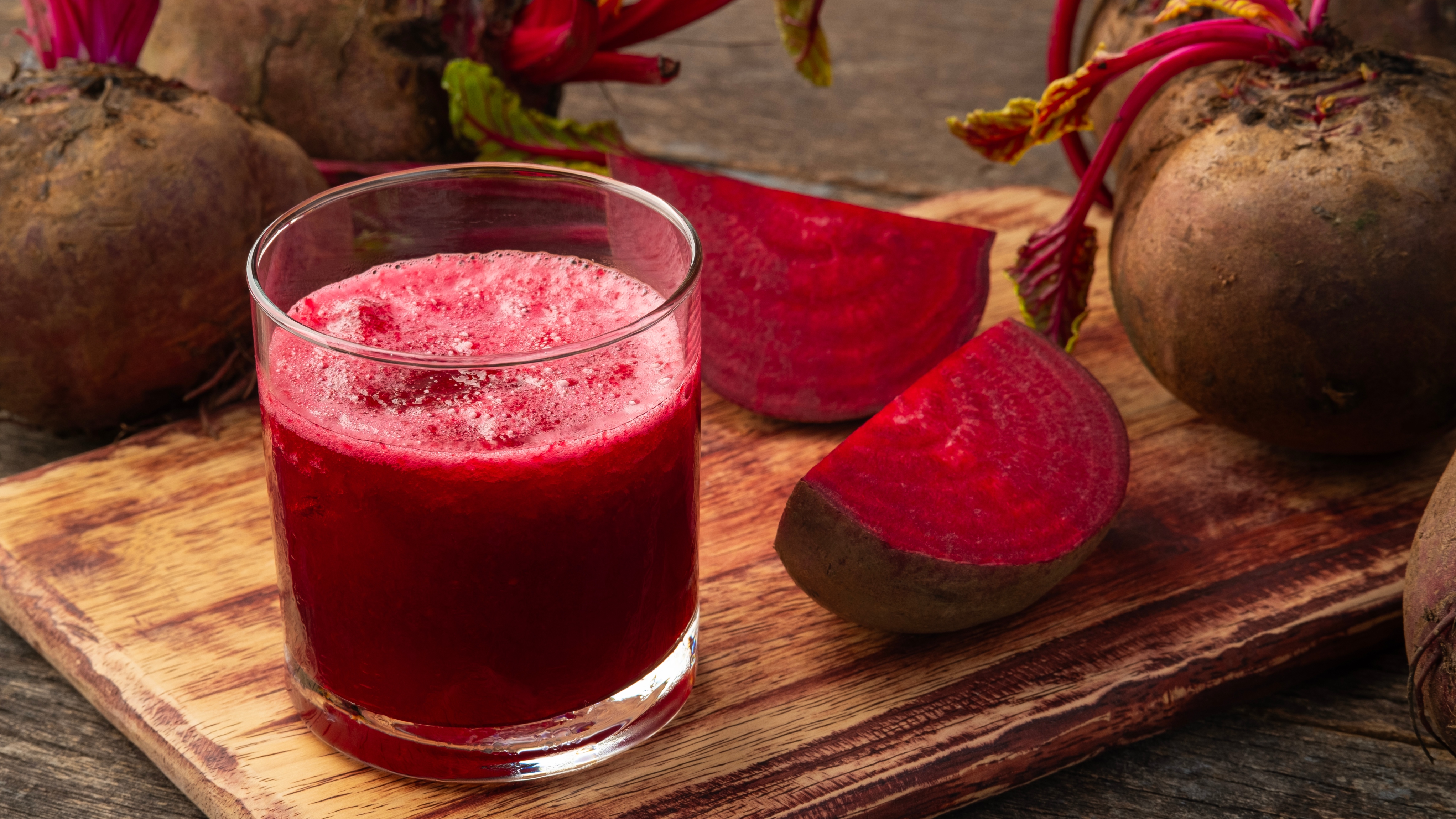Everything you need to know about nitrates
Nitrates have been shown to increase blood flow and oxygen delivery to muscles, boosting cycling performance. Rob Kemp assesses how big a gain they offer


Nitrates are naturally occurring compounds formed from nitrogen and oxygen. Dietary nitrate is found in vegetables, particularly leafy green ones and beetroot. The go-to nitrate boost for many cyclists is concentrated beetroot juice in shot form.
“Nitrate supplementation may offer several potential benefits for athletes,” says Professor Mayur Ranchordas, “including improved endurance performance, reduced oxygen consumption during exercise and enhanced blood flow.” However, there are limitations. “Most of the research shows that it’s beneficial for recreational athletes, but few studies have shown benefits in highly trained elites.”
Mayur Ranchordas is professor of applied human nutrition for sport and exercise at Sheffield Hallam University whose studies into sports supplementation and nitrates have been published in the British Journal of Sports Medicine.
What's in it for cyclists?
Nitrate supplementation is widely used to enhance athletic performance in endurance sports. “Dietary nitrate is an important precursor to nitric oxide, which is involved in many different functions linked to performance,” says Matthew Black. “These include helping blood vessels open and close, assisting with blood pressure and blood flow, the efficiency of the energy powerhouse that is mitochondria, and the processes by which muscles contract.”
Additionally, regular nitrate intake can help to lower blood pressure and support cardiovascular health. However, the effects vary among individuals, with mixed outcomes for blood lactate and sports performance, with gastrointestinal issues a potential side-effect from some formulations.
What does the research say about nitrates and cycling?
The general consensus from a wide body of evidence is that dietary nitrate supplementation can improve endurance exercise capacity. Most of the major studies show improvements of 1-3%. One study indicated an improvement in time-trial performance of nearly 3%, and other papers have shown improved short-duration power and muscle force production. Bear in mind, though, these studies were conducted on recreational athletes, not highly trained elites. Studies also indicate that dietary nitrates can boost cyclists’ power output during short, high-intensity bursts of effort, such as sprinting or climbing. This improvement is linked to better muscle contractility and reduced energy costs. In short, the research suggests that, for amateurs, nitrates have the potential to give you an edge in most aspects of cycling.
How can cyclists reap the benefits of nitrates?
“The majority of the scientific studies that have investigated the effects of beetroot on performance have used 500mg of nitrate, the amount in approximately one pint of beetroot juice,” says Ranchordas. Unless you enjoy necking pints of the purple stuff, opt for concentrated shots. The guideline dosage for cyclists is to consume 6-15mmol (400-900mg) of nitrate per day for three days prior to competition. On race day, ingest dietary nitrate two to three hours before the event. “Nitrates are naturally found in root and leafy vegetables such as lettuce, spinach, celery, and beetroot,” says Ranchorhas, adding a caveat, “though nitrate levels can vary depending on soil content.” Typically, high-nitrate vegetables contain 200- 300mg per 100g. Drinking water can also be a significant source of nitrates. “Opting for real foods rich in nitrates where possible can reduce the risk of stomach upsets and the flavour fatigue that can set in when consuming too many pre-packaged products.”
What are the limitations of nitrates?

The greatest benefits are seen in sprinting and climbing, but evidence is limited when it comes to women's doses
“Dietary nitrate supplementation is considered safe, though I’d encourage all consumers to check the ingredients list of any dietary supplement to make sure it doesn’t contain allergens,” says Matthew Black. “Also, if you have any health conditions, check with your GP before consuming higher doses. One side-effect of beetroot and beetrootbased supplements is that they may turn your urine and stools purple. This is known as beeturia, and although somewhat alarming, it poses no health concern.”
Get The Leadout Newsletter
The latest race content, interviews, features, reviews and expert buying guides, direct to your inbox!
There is limited evidence for the efficacy of nitrate supplementation in female cyclists. Hormonal fluctuations across the menstrual cycle may influence nitrate metabolism and effectiveness. Though some studies suggest improved power output and endurance in women, more research is needed to understand the optimal dosage and timing for female athletes.
Finally, if you dislike the taste of nitrate-rich vegetables like beetroot, spinach and celery, upping your intake might be unpleasant – then again, you might improve your endurance for unwelcome flavours, and that would be a win-win scenario!
Expert comment
Dr Matthew Black is a lecturer in applied physiology, nutrition and metabolism at the University of Exeter whose research projects include the therapeutic/ergogenic applications of manipulating nitric oxide bioavailability through diet. He told us...
“It is worth noting that not all individuals respond equally well to dietary nitrate ingestion or supplementation. These differences – between studies and individuals – may be due to the reliability of the tests, the number of individuals tested or the timing and dosage of supplementation. Also, the fact that some individuals seem to benefit more than others may partly be explained by the bacteria present in the mouth that allows dietary nitrate to be absorbed into circulation. Given the importance of the mouth bacteria, we advise individuals seeking to benefit from dietary nitrate to refrain from using mouthwash and tongue scraping.”
The bottom line...
“The general consensus is that dietary nitrate supplementation may improve endurance exercise capacity, time trial performance, repeated bouts of short-duration highintensity exercise and muscle force production,” says Dr Black. “All of these factors are relevant to increasing and maintaining a power output, among other benefits.” Since nitrates improve blood flow and muscle oxygenation, they also speed up recovery after intense sessions. Enhanced oxygen utilisation and energy efficiency reduces perceived exertion, too, allowing cyclists to feel less fatigue and push harder, especially during the final stages of races.

Thank you for reading 20 articles this month* Join now for unlimited access
Enjoy your first month for just £1 / $1 / €1
*Read 5 free articles per month without a subscription

Join now for unlimited access
Try first month for just £1 / $1 / €1

Rob Kemp is a London-based freelance journalist with 30 years of experience covering health and fitness, nutrition and sports sciences for a range of cycling, running, football and fitness publications and websites. His work also appears in the national press and he's the author of six non-fiction books. His favourite cycling routes include anything along the Dorset coast, Wye Valley or the Thames, with a pub at the finish.
-
 'It took everything' - Puck Pieterse outclimbs Demi Vollering to win La Flèche Wallonne
'It took everything' - Puck Pieterse outclimbs Demi Vollering to win La Flèche WallonneDutch 22-year-old shows Classics pedigree with first one-day victory
By Tom Davidson
-
 Tadej Pogačar flies to dominant victory at La Flèche Wallonne
Tadej Pogačar flies to dominant victory at La Flèche WallonneSlovenian takes second win at Belgian classic ahead of Kévin Vauquelin and Tom Pidcock
By Tom Thewlis